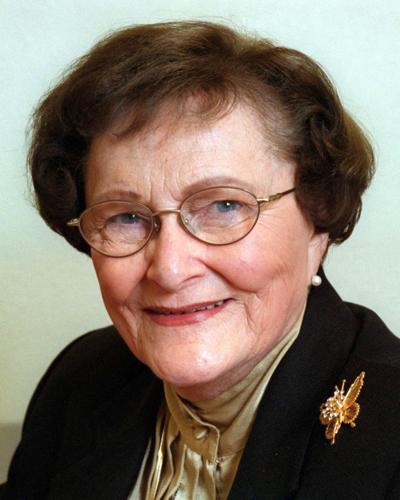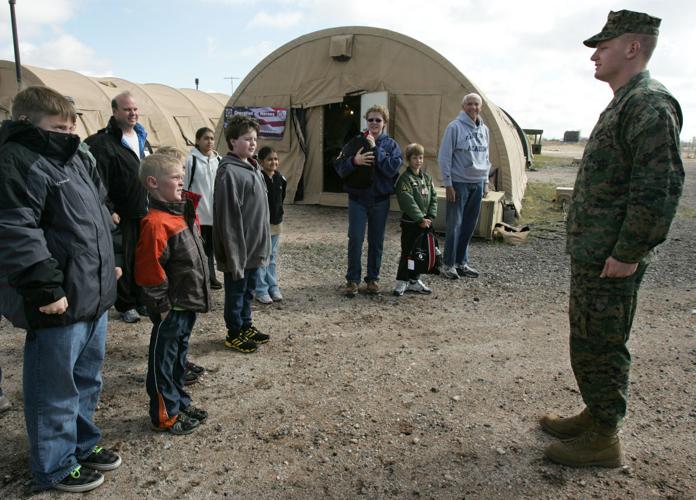In a community of nearly 1 million people, Tucson’s military roots don’t always show.
But they exist — and they’re deep.
Supporters of Davis-Monthan Air Force Base hold an annual picnic for active and retired airmen and their families. They offer marriage support classes to couples separated by deployment. They link up young airmen with local volunteers who offer homes away from home.
Boosters are doing all they can to strengthen relationships — both with D-M and in Washington — to assure the base’s long-term future. Mayor Jonathan Rothschild is meeting with the secretary of the Air Force this summer in Washington, D.C.
“Our message is very clear — we support any flying mission the Air Force wants to put here,” says Brian Harpel, president of the DM50, a 29-year-old group of local businesspeople who advocate for the base.
Last year, the DM50, the Tucson Metro Chamber and the Southern Arizona Leadership Council joined forces to form the Southern Arizona Defense Alliance, an advocacy group for D-M and other installations in the region.
“I think there’s just a heightened sense of awareness,” says SADA Chairman David Godlewski. That’s especially true now that D-M’s primary flying mission, the A-10, is facing retirement and another round of base closings is a possibility in the next few years. “The defense alliance is trying to coalesce community support in light of the threats to D-M.”
A PARKER GREENE
FOR TUCSON
In April, SADA and the DM50 partnered to hire a consultant and Washington lobbyist to advocate for D-M over the next three years.
The city of Tucson, Pima County and the DM50 are each chipping in $180,000 over three years to find someone with strong contacts on Capitol Hill and in the Pentagon.
The right person eventually could become the face of Southern Arizona’s lobbying efforts — Tucson’s version of Parker Greene, who has headed the defense of Moody Air Force Base near Valdosta, Georgia, for nearly 40 years. (See accompanying story.)
The closest thing Tucson has had to Greene is Dorothy Finley, a beer distributor who died in 2013 at the age of 92. A founding member of the DM50, Finley devoted much of her time to lobbying on behalf of the base, both locally and in Washington.
A childhood-development center at D-M is named for Finley. In 2004, the Pentagon awarded her the Zachary and Elizabeth Fisher Distinguished Civilian Humanitarian Award for her tireless efforts to promote and protect the base. Then-Navy Secretary Gordon England called her “the first lady of Davis-Monthan.”
The base’s primary advocacy role is now filled by retired military officers, business and civic groups and elected officials that have teamed up to protect D-M, says Ron Shoopman, president of the Southern Arizona Leadership Council.
But just as important as a strong and supportive team is getting the broader community to recognize the importance of D-M and to advocate for the base, says Shoopman, a retired Air Force brigadier general.
“It is our belief that the bigger the tent, the more impressive it is to those in the Congress and the Pentagon,” he says.
As part of its efforts, SADA last fall launched “Mission Strong,” a campaign to — among other things — urge citizens to write Congress and the Pentagon in support of D-M and other installations in the region.
COUNTERING OPPONENTS
Part of the reason to create SADA, supporters said at the time, was to counteract a negative impression created by critics of D-M’s aircraft noise.
Opponents have waged a letter-writing campaign to the Pentagon and Congress saying they oppose basing F-35s here. One group, Tucson Forward, contends F-35s are too loud for an urban air base and that having them here would ruin the quality of life for many residents in or near D-M’s flight paths.
The group and other activists cite the potential for health problems including hearing loss, as well as environmental and safety concerns; the F-35 is new and has no backup if its single engine fails.
In March 2014, SADA released a survey concluding that more than 90 percent of the region’s residents support military installations here, while 70 percent agreed that the benefits of a strong military presence outweigh the noise generated by louder aircraft.
Tucson Forward criticized that survey for failing to focus on neighborhoods most affected by jet noise and for neglecting to tell respondents about louder planes that could come here, such as the F-35.
Last November Tucson Forward released its own survey of homeowners near the base, showing that 57 percent oppose replacing D-M’s fleet of relatively quiet A-10s with louder planes including F-16s, F-18s, F-22s and F-35s.
The DM50 criticized the opt-in mail survey as misleading and invalid.
Both surveys found overwhelming support for D-M and the military — along with a significant number of people who say noise is a concern.
In Tucson Forward’s survey, 83 percent of respondents strongly support keeping D-M open at its current operation levels. And SADA’s survey found that 23 percent of those living near the base say noise from military aircraft has a disruptive and negative effect on their quality of life.
Meanwhile, complaints and inquiries about D-M flight operations — D-M calls them “concerns” — are up in recent years. In 2014 D-M fielded 888 concerns, up from 703 in 2013 when budget cuts limited some flight training. So far this year, the base has received 932, though nearly 60 percent were from one person, according to D-M.
SHOW OF SUPPORT
D-M commander Col. James Meger trained at the base as a young pilot in the early 1980s and returned as vice commander from 2011 to 2013 before deploying to Afghanistan.
He met his wife — a Tucson native and University of Arizona alumna — at the former Cactus Moon country bar. The couple has three children and recently celebrated 20 years of marriage.
In the base’s top job since August 2014, Meger says he’s always felt welcome in Tucson.
“There’s been some places I’ve been to where you don’t get the kind of warm reception,” Meger says. “I always felt part of the community, and I think a lot of the airmen make that connection here, too.”
The Tucson Metro Chamber’s Military Affairs Committee has run D-M support programs for decades, but added more recently.
In early 2014, the committee and D-M rolled out the Community and Military Partnership, connecting local families with airmen who are single and under age 24.
“This was really in response to the PTSD (post-traumatic stress disorder) and suicides that we saw happening across the base,” says Ellen Jimenez, chairwoman of the Military Affairs Committee.
In January, at the onset of the deployment of more than 1,000 D-M airmen, the chamber committee launched a “deployment farewell” with bags of snacks, puzzles and books to make long overseas flights more bearable.
Jimenez, director of sales at the Viscount Suite Hotel, said the chamber is working on a program to welcome airmen as they return from deployments.
“We have 1,100 families that we need to keep an eye out for,” she says.
That kind of support means the world to young airmen who may be thousands of miles from home, says Master Sgt. David Womack of the 355th Operations Group at D-M.
For example, Raytheon Missile Systems — the region’s largest private employer and a government contractor — is a major sponsor of Operation Warm Heart, an Air Force charitable program.
Womack says the company has donated more than $200,000 over the past two years to buy commissary gift cards and Christmas gifts for the families of more than 100 airmen each year.
Helping families of deployed airmen is particularly important, Womack says.
“Sometimes this is the first time they’ve been so far away from their family. When that military member leaves, that support that backfills them is pretty important,” he says. “They feel that they matter, what they do matters, especially for the kids.”
Womack says, he, too, has felt the love in Tucson since arriving here in 2012.
Womack — who oversees morale, welfare and conduct of his unit’s enlisted airmen — says Tucson offers the greatest community support for airmen he’s experienced in seven base assignments over his 20-year Air Force career.
“I’ve never seen the amount of thank-yous and support that we get from the local community,” he says. “Whether it’s in a restaurant eating lunch or breakfast or dinner — you can even be in civilian clothes, just with that military haircut — they thank you anyway. They know who you are.”





